This ranking of the best American Revolution films is based on my own appreciation of the movies. Obviously, any attempt to rank films in order is subjective and my opinions may make others cringe. Keep in mind that films are made to make money, not to be models of historical accuracy. However, some films handle the history, and “feel of the times,” better than others. Agree or disagree? Did I miss any? Which Revolutionary War movies are your favorites? Please feel free to express your opinions in the comments below.
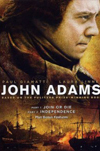 1 // John Adams – 2008. Paul Giamatti.
1 // John Adams – 2008. Paul Giamatti.
Based on David McCullough’s biography, this film (miniseries) puts great emphasis on getting the feel and the details to a very high level of excellence. The details include some rather ugly, but accurate, views of American civil violence and dissent. The scenes of Congress in action are memorable. Adams, who is not remembered for his style or media appeal, comes through this excellent film as the hard working, dedicated and fearless advocate of the United States and justice. This film is a must see. [BUY DVD] [STREAM/BUY] [BUY BOOK]
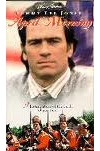 2 // April Morning – 1988. Tommy Lee Jones, Chad Lowe.
2 // April Morning – 1988. Tommy Lee Jones, Chad Lowe.
This film was taken from the Howard Fast novel of the same name. The action takes place on April 18-19, 1775 in Lexington, Massachusetts; the afternoon before the battle of Lexington through the evening of the day of battle. The tension builds as the British army marches into view. The viewer sees a boy become a man as he takes his place among the men on Lexington green and fights throughout the fateful day. The arguments between the men as to why they should, or should not, stand up to the British army explain well the conflict of principles being discussed in 1775. Excellent film. [RENT/BUY] [BUY NOVEL]
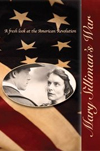 3 // Mary Silliman’s War – 1994.
3 // Mary Silliman’s War – 1994.
This film is based on the true story of Mary Silliman and her husband, General Gold Selleck Silliman of Fairfield, Connecticut as told in the biography, The Way of Duty, A Woman and Her Family in Revolutionary America by Joy Day Buel and Richard Buel. This is a wrenching tale. Absent are the ranks of soldiers firing in battle. Instead, there is the struggle of a woman to overcome the myriad of obstacles in her way. Eventually, she very reluctantly resorts to desperate measures. It is stressful, authentic and extremely compelling. The attention to authenticity is extraordinary. The viewer experiences a you-are-there feeling that is rare among films. And, the feeling is historically correct. Click here to read my complete review. [WATCH/RENT BELOW] [BUY BOOK]
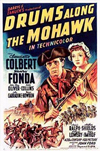 4 // Drums Along the Mohawk – 1939. Henry Fonda, Claudette Colbert. Director: John Ford.
4 // Drums Along the Mohawk – 1939. Henry Fonda, Claudette Colbert. Director: John Ford.
Based on the novel by Walter D. Edmonds. This visually appealing film is set in the Mohawk Valley of upstate New York. There, the frontier settlers are not facing a red-coated enemy but rather the dark and sinister forces of the Tories and Indians bent on destruction of the settlers and their settlements. The feel for the time and place are outstanding. It is also great entertainment. The film is excellent and can be watched time and time again. And, if you like the film you’ll love the book. [BUY DVD or AMAZON VIDEO] [BUY BOOK]
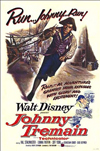 5 // Johnny Tremain – 1957.
5 // Johnny Tremain – 1957.
This is a Disney film taken from the Esther Forbes novel of the same name. While perhaps considered a film for young adults in 1957 it is far better historically than one would expect. The action takes place in and around Boston before the war and ends after Lexington-Concord. Interspersed in the film are various scenes where knowledgeable characters explain what is going on politically so the viewer understands the implications he is witnessing. In particular one should pay attention to the philosophical explanations made by the James Otis character. He spells out the repercussions of the revolution for 1775 and the impact of the revolution for future generations. This is a fine film and the book is even better. [RENT/BUY MOVIE] [BUY BOOK] [READ OUR INTERVIEW WITH JOHNNY]
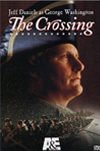 6 // The Crossing – 2003. Jeff Daniels.
6 // The Crossing – 2003. Jeff Daniels.
Based on Howard Fast’s novel of the same name The Crossing tells the story of Washington leading his bedraggled army across the Delaware River to attack the Hessians at Trenton. The film is compelling and has a good feel. Washington, an extraordinarily difficult character to portray, is handled well for the most part, by Jeff Daniels. The desperate nature of the attack is very clear and the very real tension of the event carries over into the film. [BUY DVD]
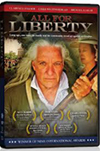 7 // All For Liberty – 2009. Clarence Felder, Chris Weatherhead.
7 // All For Liberty – 2009. Clarence Felder, Chris Weatherhead.
This film is independently produced to very high standards. It is one of the few films to depict the nature of the war in the South being Tory vs. Whig, neighbor against neighbor. Large battles were rare, small skirmishes and ambushes were very common. The film is visually very appealing and beautifully filmed. The conflicts and tough decisions citizens had to make are made clear. The action scenes are realistic and not obsessively violent. The feel of the 1770’s is very successfully depicted. Recommended. [WATCH ON AMAZON] [BUY DVD]
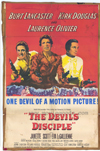 8 // The Devil’s Disciple – 1959. Kirk Douglas, Burt Lancaster, Laurence Olivier.
8 // The Devil’s Disciple – 1959. Kirk Douglas, Burt Lancaster, Laurence Olivier.
The action takes place in upstate New York where General Burgoyne is attempting to march his army from Canada to the Hudson. Along the way he is confronted with Whig militiamen who try to block his way. The film drifts considerably from the truth but it is entertaining and a pleasure to watch the famous actors at work. The details of uniforms and equipment are excellent as far as I can determine. If you can find it, record it as you’ll want to watch it again. [BUY DVD]
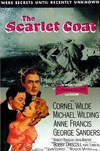 9 // The Scarlet Coat – 1955. Cornel Wilde.
9 // The Scarlet Coat – 1955. Cornel Wilde.
This film involves the American traitor General Benedict Arnold and British Major John Andre. An American officer, pretends to defect to the British, becomes a counterspy to discover the identity of an American traitor. The film did not leave me with the feel of the times. Too much effort was taken up with honor – yet, the film deals with deceit. [RENT/BUY] [BUY DVD]
 10 // America – 1924. Lionel Barrymore. Director: D.W. Griffith. Silent.
10 // America – 1924. Lionel Barrymore. Director: D.W. Griffith. Silent.
Being a silent film the viewer must pay close attention to follow the action. And, at times, it gets somewhat complicated. This film is made is the grand style with a huge cast, evil bad guys, and really good good-guys. This is an epic that includes Paul Revere, the Declaration of Independence, Washington and the war in upstate New York. While it may not portray history well the film by its very nature is history itself and worthy of watching, if only once. [WATCH ON YOUTUBE]
And of course…
 Not Ranked // The Patriot – 2000. Mel Gibson.
Not Ranked // The Patriot – 2000. Mel Gibson.
This film has some good action scenes and some incredibly poor scenes as well. I am irritated by the British soldiers who inappropriately turn their heads and wince when firing their muskets. The church burning and the strange concept that all of Mel Gibson’s black workers are employees, not slaves, are pretty hard to take. While not accurate some of the battle scenes are quite exciting to watch. I don’t watch this film very often. [BUY/RENT]
And don’t forget the stage…
MUST SEE // Hamilton – Lin-Manuel Miranda.
From Isabel Friedman: Debuted in 2015, the new hip-hop musical about the life of Alexander Hamilton, written by Lin-Manuel Miranda, has become a cultural phenomenon, winning a Grammy, the Pulitzer Prize, and many other awards. Its popularity continues to grow to monumental heights for musical theatre of any genre; the show is sold out months in advance, and thousands of people enter a daily lottery for tickets. Click here to read a full review by JAR contributor James Kirby Martin. [BUY SOUNDTRACK] [BUY INSPIRATION BOOK]
CLASSIC // 1776 – Peter Stone and Sherman Edwards.
From Isabel Friedman: 1776, written at the Bicentennial by Peter Stone and Sherman Edwards, is very true to the event of the signing of the Declaration of Independence. Consisting of a cast of all white males and two women, it accurately reflects the racial make-up of the Continental Congress, conveying and celebrating the patriarchal society, and is, in Andrew Schocket’s words, an “essentialist” interpretation of the Revolutionary era. Despite conflicting reviews, 1776 won a Tony Award in 1969, and because of its success on Broadway, producers decided to turn it into a movie. [BUY DVD OF MOVIE]
LESSER KNOWN // The Ruckus at Machias
From Isabel Friedman: The Ruckus at Machias, written by Richard Sewell and debuted in 1976, portrays local rather than national history. Centered on one of the first naval battles of the Revolutionary War, The Ruckus at Machias follows both “Tory and Rebel factions” as they navigate June 1775 and the effects of the beginnings of the Revolution in rural Machias, Maine.[6] The action centers on Hannah Weston, whose husband Josiah Weston goes against her wishes to fight the Tories and capture British soldiers aboard a ship docked in harbor, the HMS Margaretta.
RENT/OWN Mary Silliman’s War film and watch it now on your computer or mobile device.
Editor’s Note: This article was originally published in January 2013 and was updated in January 2017 for comprehensiveness.




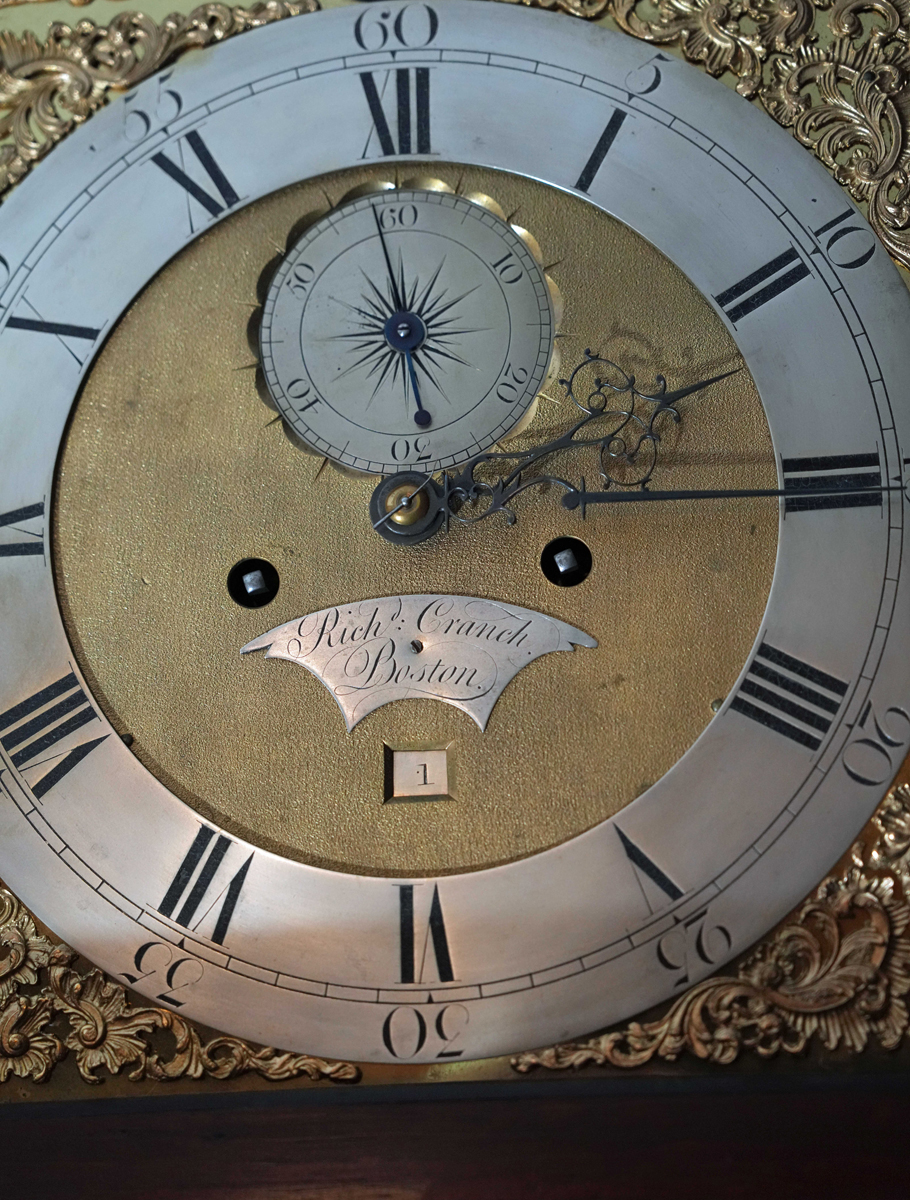
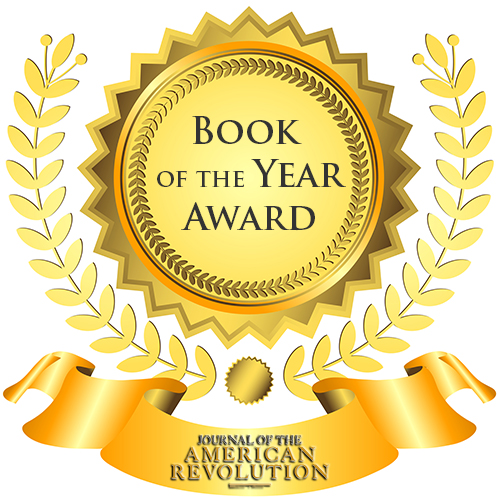
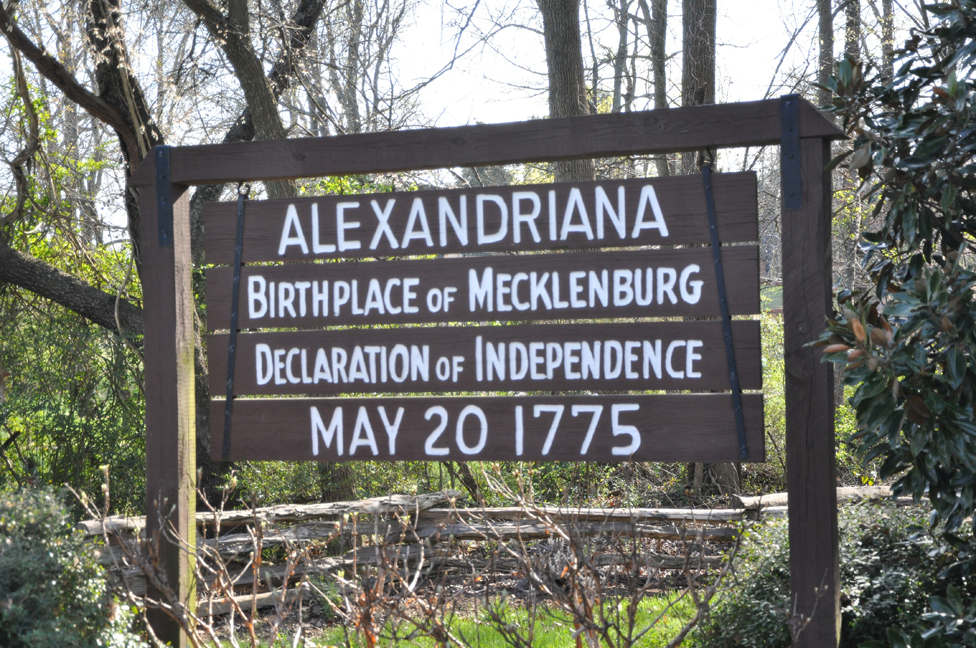

116 Comments
Excellent summary. I’ll need to check these out. I’ve only seen John Adams and the Patriot. I’ll check out April Morning.
Have you thought of putting together a list similar to this for documentaries/bios? I’ve got a number of Rev war PBS, History Channel and BBC disks on the topic but haven’t had a chance to watch them all.
In my opinion, the PBS Liberty! is still one of the best documentaries on the Revolution.
It is a good one (although I found the actor portrayals hit or miss). I am about half way through ‘The Revolution’ by the History Channel. Unfortunately, I share the dvd player with my kids, so its slow going.
Skip “Liberty” and go with History Channel’s work on the Revolution and the Founding Fathers. Also, the PBS cartoon “Liberty’s Kids” is very good.
Also, there is a TLC series called “The Revolutionary War” that is very good.
By far, John Adams and The Crossing are my favorites. I think there is a lot of value in Daniels’ very human portrayal of Washington as opposed to what I think we all assume is the more historically accurate portrayal of him as human statue in John Adams. Just like John Adams really brought to life the debates and contingency of the 2nd Continental Congress, The Crossing did the same for the attack on Trenton. And I know there is a paucity of 18th-century films but The Patriot wouldn’t even belong on a Top 100 list.
I teach U.S. history at the high school level working with alternative teens, who face many learning challenges. I like to use several of these films, In particular, April Morning, The Crossing, and John Adams. Of course, I always make sure that my students realize the difference between movies for entertainment versus a documentary that tends to be instructional or informational. However, sections of a movie may generate student enthusiasm for a topic that will then encourage them to read the numerous primary sources that I use as instructional materials for my lessons. Those movie segments may be the spark that will motivate my students to seek out more information and knowledge. Typically I only use segments of 10-15 minutes to help set the tone for a lesson. With the increasing demands in classroom curriculum being squeezed for every minute, no good teacher has the time to show any film in its entirety. So what we use needs to be carefully scrutinized for it learning value.
At the risk of being laughed off this website, I add to the very fine list, the film ‘Revolution’ directed ironically by Brit, Hugh Hudson, and starring Al (‘Here come da British’) Pacino. If you take the Godfather out the film isn’t half bad. It portrays colonial NYC, the Battle of Brooklyn, camp life (both sides) and other historical details fairly well and at least as good as ‘The Patriot.’ In the late 50’s early 60’s Disney did a pretty good series about Francis Marion, The Swamp Fox.
I’m not laughing, Steven. I haven’t seen “Revolution” and can hardly imagine Al Pacino….but, I’ll keep an eye out for it. There is another, “Mary Silliman’s War” which I saw perhaps 20 years ago but haven’t seen it since. At the time I thought it was excellent but as I hadn’t seen it in so long – and can’t find a copy, I didn’t include it in the list.
I forgot to mention ‘Sweet Liberty’ which is not exactly a film that deals with the Revolution. Unless, you want to count what happens to a small New England town when Hollywood comes to shoot a movie based upon a local historian’s (Alan Alda) best-selling book about a colonial woman (Michelle Pfeifer) inbolbed with a British officer (Michael Caine). Light comedy, very light history but worth the performance of the film within a film director, Bob Hoskins.
“Revolution” certainly had more of a gritty historical feel to it than did “The Patriot”. I still believe that “The Patriot” could be edited into an excellent 15 minute film. “Revolution”, on the other hand, only needs to have its soundtrack reworked.
I have heard the recent Director’s Cut of “Revolution” is much better than the edition originally released in 1986.
I agree with you Michael….I got the Director’s cut and its much better. It explains who, what and why things are going on in the film with Pacino’s over voice.
SPM. I just watched Revolution and found it highly entertaining. The movie depicts the ebbs and flows of pubic sentiments and the impact of changes in fortune on the average person. While highly romanticized, the viewer imagines what it was like to live in revolutionary times. I highly recommend as an addition to this list.
Many of the battle seens in the Patriot were off base. Soldiors were too close together, and like you said about the slaves. However, the British turning their head when firing was a trained move. The explosion in the pan caused tiny shards of flint to scatter in all directions.Many a soldier got a scratched cornea from this. Some soldiers were blinded in one eye because of this. We re-enactors nowadays have a flash guard on the pan to prevent this. Its required at Battle events.
Scott –
The Patriot leaves a lot to be desired in many areas. Can you provide a primary source indicating that British soldiers (or any soldiers) were trained to turn their heads? I’ve never seen it and it’s not in the period manuals. Also a primary source for the scratched cornea and blindings. I’ll have to look again but if I remember correctly the muskets in The Patriot did have historically incorrect modern flash shields. These shields would not protect the shooter but rather the man standing to the right of the shooter – he in line with the touchhole. I shoot a lot of flint – including a Brown Bess….and I always wear shooting glasses. I have been told by reenactors who were involved with the battle scenes in the movie that the muskets had an electrical gadget that set off magnesium in the pan rather than black powder….apparently to give more of a flash for the camera. These people also said that they would turn their heads – not from the flash, or because someone thought it was historically correct but because they wanted to express their disgust with the film. But, I don’t know that is fact. Please let me know about any primary sources you have for the turning heads and eye injuries.
Mr. Harrington: I can’t confirm the gesture of disgust, regarding turning the head, but I worked in a Prophouse that provided a few of the muskets used. They actually enlarged the touchholes, (effectively ruining the musket, unless they were then tapped for touchhole liners) to allow the wires for the magnesium igniters to fit through. I had heard that the extras turned their heads, because the flash was so startling, nobody could get them to continue to aim, but that was a rumor, so again, I can’t confirm. However, accurate firing of any firearm, as you know, can be thrown off by subtle things, like the elbow position I mentioned in another comment, (right elbow held close to the ribs, as depicted in period illutrations and manuals) and a movement as dramatic as turning the head would make it almost impossible for the soldier to hit a barn, even from the inside!
BTW: one of our muskets came back with the stock splintered in the lock area, having been stomped by a horse: I glued it back together, wrapoed it with wet tawhide, in “indian” fashion, then decorated the stock with the incised pattern from the firelock held by the Iroquois in the painting “The Death of Wolfe”, so the musket wouldn’t have to end its life in parts bins.
The true hero on whom the movie “The Patriot” is based was Francis Marion, called “The Swamp Fox”. Francis Marion, like some other Southern Colonial citizens, never owned slaves. That is a fact. One of my NC ancestors raised a company of cavalry, equipped them and paid their puny wages—and he, as far as we can tell, owned no slaves. His son, my great-great grandfather and also his cousin, both of whom became Medical Doctors in 1824, were life-long abolitionists. My ggg lived in a little town in the Florida Panhandle and his cousin lived in coastal NC. AND their sons fought for the Confederacy—not to defend slavery, as their families owned none, but for States Rights.
Thank you, G Jackson. I was hoping someone would correct that misconception, that all Southerners would automatically be pro-slavery. It simply wasn’t that stereotypical. Never is, where history is concerned. Far too many assumptions take place from those who could never know exactly what went on in the past. Thanks again.
My ggg-grandfather also fought for the ‘Militia’ in the Carolinas, and his uncle was even captured at Camden. So ‘The Patriot’ is a movie which means a lot to me.
Scott Hiser, turning the head when firing, and calling tge front sight a “bayonette lug” are reenactors’ myths. The British soldier was trained to choose a specific man in the opposing line, and aim and fire at him. Period Manuals of Arms and the numerous training guides by various officers are consistent on this, encouraging regiments to provide extensive training in firing at marks, reminding Serjeants to exhort the men to aim low, to counter the tendency to aim too high, and otherwise specifically making reference to aimed shots. A properly-formed line, and properly positiobed musket, with the right elbow held DOWN when firing, pushes the butt of the musket up and forward, positions the right eye more in line with tbe breech, and moves the fkashpan fartver away from both the firer and tge man to his right. Having the men oroperly positioned within the line also prevents the flash hitting anyone.
Scott, I shoot flintlocks with regularity many times without the flash guard. I have never gotten scratches on or near the eye from the flint. The flash guard is more for the shooter next to you than for yourself.
My biggest problem with the Patriot is that the story isn’t real. There are plenty of “real” stories of Americans that would make an excellent movie. Why not do one of those? Why change it? A movie on Joseph Plumb Martin would be excellent. It would have plenty of action, show what an average soldier went through, and it would be humorous at times. We need to get Americans interested in our history. What better way than to introduce them to real people?
I wish someone would do a movie about Dr. Joseph Warren.
Your wish may come true. Read here: http://charlestown.patch.com/groups/editors-picks/p/ben-affleck-tapped-to-direct-bunker-hill-film
The fact that Dr. Joseph Warren died at Bunker Hill left him out of the “main event” in history. Yet he was a vital component to the early struggles leading up to Bunker Hill. He is one of my Revolutionary Heroes as well. The only place I have seen his story in any detail is in the “Sons of Liberty” series which took liberties with the facts as we all know.
THE FILM, THE PATRIOT, WAS TAKEN FROM ACTUAL EVENTS IN SOUTH CAROLINA DURING OUR REVOLUTIONARY WAR. THE FILM WAS LOOSELY BASED ON BRIGADIER GENERAL FRANCIS MARION, WHO HAS BEEN CALLED THE FATHER OF GUERILLA WARFARE. HE WAS OF DIMINUTIVE STATURE BUT WAS A VERY BIG MAN IN HIS EFFORTS TO OUT WIT THE CHEROKEE INDIANS IN THE INDIAN WARS AGAINST THE COLONY, AND EVENTUALLY, THE BRITISH IN OUR INDEPENDENCE, WHO CALLED HIM, ‘THE SWAMPFOX’. LAKE MARION AND THE WHOLE AREAA IS DEDICATED TO FRANCIS MARION. CHECK YOUR HISTORY BOOKS PEOPLE!
The film “The Patriot”, when it was first conceived, was going to be about Francis Marion. This got whittled down more and more, until there was pretty much nothing at all historical about the move. True, there was a place called South Carolina, and true, there was a Revolutionary War… but other than that, everything else is pure fantasy. So there are bits and pieces of Francis Marion in there, but the end result was nothing based on actual history at all and I cringe whenever I watch it.
Fun little bit of trivia on the movie set. The German director… who destroyed the history of the movie… wanted to have a big French and Indian War battle put into the script… the one that “Benjamin Martin” would have PTSD about. However South Carolina really wasn’t in the French and Indian War. True, there was the Cherokee War of 1760, but not officially part of the F&I. So the director, Emmerich, kept wanting to know of a battle and we kept telling him there wasn’t one. Finally, to get him off of the subject we told him of a horrible bloody massacre at Fort Wilderness. He liked the story we told him so much that he put it in the script and this is the battle that Benjamin Martin feels sorry about through the whole movie.
So, what is the joke? There is no Battle of Fort Wilderness in South Carolina. Fort Wilderness is in Disney World.
Lindsay, I couldn’t agree with you more…on all points. Maybe someday the movies will get better. Until then – take a look at Mary Silliman’s War. It’s a winner.
Mr. Harrington: Many years ago, I worked as a consultant on Mary Silliman’s War – first on the script editing and then for on-site “stage settings.” I’m glad you rate it so highly. It was hard sometimes to argue for what to put in a scene and what to leave out. 1920 Dietz lanterns are just one example.
You may laugh but, though it isn’t an action movie that shows battles, etc. my family watches 1776 every year for July 4th. There are historical inaccuracies however you get a great overview of the creation of the Declaration of Independence – and who doesn’t love our founding fathers singing and dancing? 🙂
Shelly –
I watched 1776 a few weeks ago. I liked it….but, if it were my production I’d have left out the singing and dancing. I guess I’m just no fun at all 🙂
I enjoy The Patriot. The costuming and cinematography are stunning. It’s a good gateway story that promotes curiosity about the French and Indian Wars, the Revolutionary War and the siege of Fort Henry. I noticed the movie’s battle of Cowpens had used some accurate strategy. The movie gave me some insight into my ancestor, Capt Trueworthy Ladd’s experiences in both wars. I like it because it is so loosely based on events that It gave me a starting point to study the wars. I’m an Honorary Regent of my local NSDAR Chapter, and have proven 15 Patriot Ancestors.
Interesting list, but I’m surprised “1776” wasn’t mentioned. Sure it’s a musical, but it’s got a solid foundation in the letters and other writings of the participants. Plus, I really enjoy the portrayals of Franklin, Jefferson and Adams. It’s the one movie I watch every year around July 4.
I agree with you Paul. I watch “1776” on or around the July 4th and from what I have read about the founding fathers is, the film gets the portrayals close. Plus pretty neat All Star cast too. In the middle of the film I was not well informed on the whole rum controversies. Until I pick up a book called “The American Revolution and the West Indies” edited by Charles W. Toth, now the whole scene makes sense.
The church burning with the people inside in The Patriot is an incident that did happen and is not a fictional addition.
I have always been led to believe that the church burning in The Patriot was fictional (the Nazis did this in France in 1944). What evidence is there it happened as portrayed? Whilst Mel Gibson said “lighten up it’s just a movie” there seem to be lots of people who think that the movie was based on fact rather than a healthy does of fiction.
Terrible atrocities did occur in the Southern campaign, the most horrific of which were perpetrated by the Cherokee Indians. Perhaps the church scene was a stand-in for the entire mass of tragic realities on the frontier.
In my opinion, the single most powerful scene in any of the films listed is the one in “The Patriot” in which the young woman stands up in church and makes the case for the Revolution. Why would a man leave family, home, work, everything dear, to risk all in the cause of liberty? She encapsulated the answer to that question with incredibly stirring eloquence.
I met a woman who was related to the real life movie villain of “The Patriot”, and I asked her if he was as bad as the movie had him. She said, “No. He was much, much, worse.”
Obviously the woman had no clue about the real Tarleton. Tarleton was not “much worse”, and there have been entire books written about just that subject. Tarleton never killed slaves. Tarleton never killed women and children. Tarleton never killed prisoners. So what did Tarleton do? He was an extremely effective cavalry commander, one of the best the British had to offer, which is why he continually got his own command and terrified just about everyone he faced. He would be on par with someone like Patton, or Custer (not the later Custer facing the Sioux, but the younger one from the Civil War). Here is a link to one of the many books that debunk the Tarleton myth. It is called “Brutal Virtue”: https://www.amazon.com/Brutal-Virtue-Reality-Banastre-Tarleton/dp/0788420992/ref=sr_1_3?ie=UTF8&qid=1479961186&sr=8-3&keywords=tarleton+myth
The main character in The Patriot and some of the incidents surrounding him are in part based on a real character from that time…His name was John Beckham Sr. He was a noted scout and spy for George Washington during the Revolution. He was,also, my ancestral grandfather from South Carolina.
By the way: John Adams is my favorite among this group….too.
About the Patriot….the soldiers turning their heads away from the muzzle flashes is entirely historically accurate. The flash was so large, that it would actually burn the face if too close. This is the reason for the head turning. And the church scene never did happen, but it was based on other events of similar nature. Anyway, fantastic list! I’m actually ordering John Adams at this moment because of you!
All For Liberty is an excellent inclusion in the top ten. It is well done with outstanding history. What a wonderful addition in preservation of our Revolutionary War history!!!!!
I have a collection of films on The Revolutionary War. Making my collection didn’t take too long, since there don’t seem to be many films on the subject. For this reason. when I saw the title of this page, I thought, “It could just as easily be named ‘ALL the films about the American Revolution?.” However, you did mention a few that were unknown to me. and I’ll be looking into them.
Perhaps you have some knowledge of a film I have been looking for without success. “MediaOutlet.com” has a set of films about the Revolution. Most of them are said to be taken from Martin Gable’s film on the subject. Obviously,this implies a film of much greater length, but I have not been able to find any mention of this film anywhere else. Are you familiar with it?
Warren, I’m not at all familiar with those films but will look into it.
“Warren, I’m not at all familiar with those films but will look into it.”
Remember? Have you been able to find out anything about Martin Gable’s film(s) about the Revolution?
I briefly looked a year or so ago. Couldnd’t find anything so moved on. Sorry.
I’ve come across another film that I love that I didn’t see on the list and that is 1776. While it is a musical and can become corny at times and some of the content is not true, it is an excellent film that I believe portrays the personalities of some of the founders very well. The movie really revolves around John Adams and his persistence in trying to get the votes needed for independence. At the same time it touches on the slavery issue and shows why they had to keep the issue away from the independence issue. It also shows the interaction of the founders. The movie shows how hard the founders had to work to get people to agree to the idea of independence and that everyone didn’t just show up one day and decide on independence. It is an old movie, made it 1972, but I believe it is one that should be given a second look.
I appreciate this list and am particularly glad to see THE PATRIOT potentially bumped from it. The church burning was just too much to bear. Now, I had never heard about ALL FOR LIBERTY and may have to shell out $20-some dollars for it. First I am trying to find out if there really was an ARTICLES OF SEPARATION in South Carolina under Governor Rutledge and if Henry Felder actually wrote such a document. Normally I can find on Google even the documents whose authenticity is challenged, such as the Mecklenburg Declaration. What am I doing wrong in looking for a text of the “Articles of Separation” that Felder supposedly wrote? I tried to watch THE PATRIOT and ought to have been thrilled by it because I had a double handful of German and Scots-Irish men at King’s Mountain, some from just south of the border in SC but most from NC, and would have loved having a handsome old actor playing my grandparents and uncles. However, a handsome old anti-Semitic actor is impossible for me to watch without inner checks, (I won’t even be able to watch TIM any more)and anyhow Gibson’s playing fast and loose with history kept me from finishing the movie. I would like to watch ALL FOR LIBERTY but I don’t want to be lied to about ARTICLES OF SEPARATION. Please, is there such a document?
Hershel-
The “Articles of Separation” which the film “All For Liberty” refers to is commonly called “The Orangeburg Declaration”. According to “History of Orangeburg County, South Carolina, 1704 -1882”, by A. S. Salley, Jr., the declaration was a product of the South Carolina Provincial Congress which met at Orangeburg in March of 1776. John Henry Felder was a documented member of that Congress, and from all accounts was very influential in South Carolina politics, both before and after that session. Felder was a long-time member of legislative bodies in South Carolina and it was said that when Felder brought forward a piece of legislation it was “passed before it was presented”. Felder lived near Orangeburg and is buried just over two miles away. His signature is the first upon the “Orangeburg Declaration”, signed March 26 1776, and numerous historians have concluded that he is its single most likely author. Google “The Orangeburg Declaration, 1776, Henry Felder” you will get a wealth of hits and you can read more for validation, but I believe you will find that the so called “Articles” were real and that there is no doubt that Felder was involved.
“All For Liberty” is a low-budget family production that is worth seeing. The Felder clan used friends and local re-enactors to a great extent, there were few camera angles involved, resulting in a straight-forward piece with no Hollywood gloss. As best as I’ve been able to tell, it is accurate to the version of the South Carolina backcountry AWI story has maintained by the Felder tradition ( I excuse the ruse of the empty cannon since obtaining firing cannon, qualified crews, requisite licensing and actually building and destroying a fort replica would have been prohibitively expensive for such a production).
Thank you, Jim. I see that in February 2014 I did get hold of the text in the South Carolina & American General Gazette for 17 October 1776.
I was rushing past newspaper articles the other day but I got the impression that A. S. Salley was running a one-man “Denial of the MecDec” operation for a long time. He had a unique piece of Revolutionary paper with one of my ancestor’s names on it. I hope his private papers went into a public archive.
According to a number of articles written about Salley over time, the AS Salley papers are in the Caroliniana Library; which I believe is at USC in Columbia. See the numerous footnotes in the Salley section within “Palmetto State Memory” at http://scdah.sc.gov/aboutus/Documents/palmetto-state-memory.pdf
Good luck!
For those interested in reading the Orangeburg Declaration, the document is included as the entry for 26 March 1776 in the “Journal of the Provincial Congress of South Carolina, 1776, (Provincial congress, February 1-April 11, 1776) is available as a free Google book at:
https://play.google.com/books/reader?id=_Y01AQAAMAAJ&printsec=frontcover&output=reader&hl=en_US&pg=GBS.PA120
I agree on the Patriot, Col John and Jane Thomas are my GGGGG grandparents, Mel Gibson screws everything up with his mess. Unwatchable more I learn the true history.
What about “The Howards of Virginia” from 1940, starring Cary Grant? I would recommend it solely based on its starting point and solid grounding in the Stamp Act crisis as well as its portrayal of deliberations in the Virginia colonial legislature.
I totally agree. It helps understand how the movement toward independence shattered families, something usually taught as part of the Civil War, not the War for Indepence (in my experience). Cary Grant is his usual corny (but lovable) self–but he shouts at the top of his lungs throughout the entire movie! This acting keeps his character rather more shallow than it deserved to be, but his wife and two sons are well-acted. And it was fun to see a (probably totally fictional) young Thomas Jefferson.
“The Howards Of Virginia” was Cary Grant’s first costume drama. The box office on it was so bad that he refused to do another one for 17 years.
Mr. Harrington,
What are your thoughts on the 12 hour mini-series about George Washington from 1984?
I recently watched it for the first time and found myself entirely enthralled. The battle scenes were pretty spectacular (for 1984) and the dramatic scenes seemed to be spot on.
I was just wondering what you thought of it?
Thank you for your time.
By the way, I agree with you about John Adams. That is my all-time favorite move.
Historical Ken –
When I started compiling this listing I thought (being a historical kinda guy) in terms of “movies” – the kind that appeared in movie theaters. Then, it became apparent that there were quality made for TV productions that ought to be included. Perhaps, this listing ought to be expanded to the top 20 as so many really good Revolutionary War productions that narrowing it down to 10 becomes impossible.
As for the 1984 GW mini-series…..I must admit to having forgotten about it. And, I haven’t seen it in a long time. I’ll track down a copy and give it a look.
Thanks for bringing this to my attention.
I received Mary Silliman’s War for Christmas.
You were spot on in your review of the authenticity and high historical quality of this movie. I was not only impressed by the story line, but of the attention to detail – the little things in the background that brings this movie to life – which I felt was extraordinary.
Thank you for your recommendation. It was a fine gift indeed.
Ken Giorlando, glad you enjoyed Mary Silliman’s War. I watched it again a couple of months ago and was reminded of the high standards you mention. Odd that such a high quality film is not better known among those interested in the Revolutionary War. Thank you for leaving your comment.
John Adams was excellent. So many scenes, like after the White House is stripped bare, in that field of mud, stay with you.
April Morning I liked for much the same reason. Especially when Tommy Lee Jones tells his boy to load more powder in his rifle because he’s aiming to kill a man. It put a real weight on the moment, on what he was planning to do.
Just saw Drums Along the Mohawk last month on TCM. Thought the best scene was Fonda, shell-shocked, recalling the battle, which turned out to be him improvising.
Loved Johnny Tremain as a kid, and it’s still great entertainment, but the last time I saw it, I felt the best part was just as you said – James Otis, laying down what would come.
The Crossing was very good and showed the cold reality of the battle. Liked how they had Washington sit unceremoniously in his boat, even if they couldn’t bring in a blizzard for full authenticity.
The Patriot showed the connection to the French and Indian War, and how we’d fought with the British then. And what we owe to the French in aiding us.
The rest I haven’t seen, but will be on the lookout for. Thanks!
I am still hoping someone will tell me if the Articles of Separation (ALL FOR LIBERTY) were real and if they can now be seen on the Internet. I can’t find them and want to read them.
Mr. Parker.
I suggest that you contact the people who produced “All For Liberty” through their website http://www.allforliberty.com.
This is an interesting list, to be sure, but it presents a mixture of feature films, made-for-TV movies, and mini-series. I would argue that these are distinct media and deserve to be judged by different standards. A list for each of these categories would provide space to consider the excellent CBS _George Washington_ mini-series from the 1980s, which starred Barry Bostwick and Patty Duke; the _Adams Chronicles_ that PBS produced for the American Revolution Bicentennial; and CBS mini-series on Benjamin Franklin that starred Lloyd Bridges and at least one of his sons. Then there is _The Bastard_, the televised treatment of John Jakes’ pot-boiler novel. This would create more room in the feature film category to consider Al Pacino’s _Revolution_, Robert Stack’s _John Paul Jones_, and Cary Grant’s _The Howards of Virginia_. A number of made-for-TV movies could also be discussed — such as A&E’s _Benedict Arnold_. There were also Revolutionary War television series, such as Disney’s _The Swamp Fox_, NBC’s _Daniel Boone_, ABC’s _The Young Rebels_, and the animated _Liberty’s Kids_ from PBS.
These are an excellent suggestions and are something that is being discussed and considered.
The one thing The Patriot did do was to show how bloody the American Revolution was…no other movie show this kind of realism.
I think the A&E documentary “The American Revolution” was one of the best. That cover a lot and made it very interesting, plus the soundtrack is great.
Appreciate the list! We are just getting into John Adams, I do have to correct some bugs in it that bug the stew out of me. Just in the first episode, the portrayal between Sam Adams and John is all wrong. John was actually part of the Resistance well before these scenes came about, and his praise for Sam is well documented. The portrayal of the ‘Rebels’ as thugs in the court scenes was inaccurate. Not all redcoats were found innocent, actually 2 or 3 were found guilty…I know they’re trying to make John Adams the highlight, but at the risk of modifying historical references makes me wrinkle my nose. I like the Patriot, more from a family bonding perspective than historical movie, but each to their own. I think what this nation needs now is a historically accurate portrayal of this wonderful nation’s birth…too many history books are eliminating or diminishing the role of important key figures such as: Patrick Henry, Samuel Adams, Thomas Jefferson, and even George Washington…our family is taking a trip to DC next month and want to give them the whole story…I’d also love for you to give a top 10 list of books! 🙂 We love Abigail Adams’ biography! 🙂
Tara – Movies aren’t always historically accurate but they, if they are good, will at the very least give a good “feel” for the period. You mentioned “The Patriot.” I heard today that the young actress who portrayed Mel Gibson’s youngest daughter in the film died today.
As for your request for a list of books, look at the top of the page – put your cursor on “Features” a list will appear on the left. One of the items listed is book reviews. Click on that and you’ll find our book reviews….and, see that there are 3 articles on the “Essential” books, Beginning books and 20 top novels. That’s pretty close to your request for a top 10.
Hope you find some books that appeal to you and that you enjoy your trip to DC.
For an interesting take on the interplay of the goals of filmmakers and historians, Nancy L. Rhoden’s essay “Patriots, Villains and the Quest for Liberty: How American Film has Depicted the American Revolution” considers twelve films on the subject and raises some interesting points: http://muse.jhu.edu/journals/crv/summary/v037/37.2rhoden.html
With regard to the accuracy of AMC’s Turn (which has been the subject of some posts on this site in the past and Don Troioni opines as “very bad”) this blog is also of interest: http://spycurious.wordpress.com/
One of my favorites is “The Howards of Virginia” with Cary Crant…1940. Much of the film was shot at Colonial Williamsburg, much of which had only been recently restored or reconstructed at the time of the production. The Capitol, Raleigh Tavern and Governor’s Palace are prominently featured.
I love this movie….it was nominated for 2 academy awards. If you’ve never seen it please watch it. Cast
Cary Grant as Matt Howard
Martha Scott as Jane Peyton Howard
Sir Cedric Hardwicke as Fleetwood Peyton
Alan Marshal as Roger Peyton
Richard Carlson as Thomas Jefferson
Paul Kelly as Captain Jabez Allen
Irving Bacon as Tom Norton
Elisabeth Risdon as Aunt Clarissa
Anne Revere as Mrs. Betsy Norton
Tom Drake (as Richard Alden) as James Howard at 16
Phil Taylor as Peyton Howard at 18
Rita Quigley as Mary Howard at Age 17
Libby Taylor as Dicey
Richard Gaines as Patrick Henry
George Houston as George Washington
Ralph Byrd as James Howard
Dickie Jones as Matt Howard at 12
Buster Phelps as Thomas Jefferson at 11
Wade Boteler as Uncle Reuben
Mary Field as Susan Howard
R. Wells Gordon as Colonel Jefferson
Charles Francis as Mr. Douglas
Burton McEvilly as Alexander Hamilton
Peter Cushing as Leslie Stephens (uncredited)
Walter “Boots” Fannin as wedding groom
Vernon Downing as John Walker
Leyland Hodgson as British Officer
Thank you, very much Donna. I have never seen it. I live in Richmond, a very short drive from Williamsburg. The movie sounds very interesting and I will watch it the first chance I get. Thank you for the recommendation.
In reagrds to “The Patriot”, I wouldn’t expect that I would need to inform you of this but some people in the colonies actually viewed the blacks on the plantation as employees. They were treated well, fed, paid, and given the option to leave if they so chose. This is fairly common knowledge and curious that you find it odd that it was represented in this movie.
Could you please supply some documentation for the widespread use of free blacks as plantation laborers before & during the American Revolution?
This was not “common knowledge” when I went to school & none of my later reading supports this assertion.
The turning of heads while firing muskets was actually common practice considering you had a flashpan full of black powder right next to your eye. Unlike modern firearms you don’t have to worry about burning your eyes out with each shot.
The turning of heads while firing muskets was NOT common practice, at least not among trained soldiers. Read about how soldiers were trained here:
https://allthingsliberty.com/?s=aim+of+british+soldiers
As ive always understood it, if you need to turn your head when firing, you have put too much powder in the pan. I learned this when i first started in the hobby by nearly losing my eye lashes once! Drill books from Steuben’s Blue Book to others show images of soldiers looking down the barrel during firing. There is also plenty of evidence of the British Army in America spending mornings “firing at marks” to practice firing. If you turn your head, you certainly wont hit that mark! In fact, look at the lovely painting “The Battle of Jersey” the Brits are clearly looking at the French they are firing on.
But you MUST include “1776” on here! That movie set the course of my life when I was in 5th grade – so much so that I am now a History professor and 2 days ago I sang a solo concert at the Pentagon (yep, the actual one) that included two of its songs 🙂
Vicki – I’m delighted to hear that the film (and history) had such an impact on your life. Congratulations on singing at the Pentagon and thank you for making the effort to teach history. Huzzah!
It’s not a feature film but it’s worth watching … “Give Me Liberty” (1936) Academy Award for Best Color Short Subject
https://www.youtube.com/watch?v=HHo-3LEcgQE
The reason the extras are turning their heads in the Patriot is due to Roland Emmerich, German director, wanting a more spectacular effect. We trained the “British Army” for several months back in 1999. They were done by the manuals of the time, the 1764 manual, but also the Volunteer’s Companion. These men, about 400 of them, were the best representation of the King’s army in the 18th century any Hollywood had ever seen… that is until Roland Emmerich showed up. He proceeded to dismantle everything we had done to train them. As for the turning of the head, these guys would fire impressive volleys on command, without flinching or hesitation. However the flash in the pan of the musket was not impressive enough for Emmerich. So when they were filming a night scene the props department substituted black powder, with magnesium powder and put batteries in a hollowed out well in the stock to ignite the magnesium powder. You can see this huge flash effect in the night scenes. Well, the extras got burned by this powder. The next day we are filming the “Battle of Camden” scene, and the extras a really gun shy about putting their face down on the stock and getting it burned… like had happened the night before with the magnesium powder. So many turned their heads. It was not part of the drill, but they did it because they were not going to get “burned” a second time. This movie was so bad that most of us historians walked off the set before the filming of the last battle.
Excellent information solving an “unfortunate” mystery for many! Thanks for sharing.
Also, there was no burning of the churches like that anywhere in the South during the Revolutionary War. If any commander, British or American, had suggested killing women and children, their own soldiers would have revolted and put them up on charges. The idea of the burning church was also from Roland Emmerich. He wanted the British to look as evil as the SS in WWII. He took the idea of the burning church from the Russian front of WWII. Never happened here.
I can’t think of churches burned with people inside, but Presbyterian churches and burial grounds were trashed, desecrated, and destroyed in many parts of New York throughout the course of the war.
No argument there. Major James Wemyss in South Carolina, went out of his way to burn the Presbyterian churches. If it wasn’t Anglican, they were considered “sedition shops” and needed to be burned down.
The war had almost come to a halt down here after the surrender of Charleston. Everyone thought that the war would end in a draw, so most folks quit fighting. This was until Christian Huck, of Tarleton’s Legion, went out of his way to start burning churches and killing former soldiers in pretty brutal methods, such as drawing and quartering. This led to what was known as The Presbyterian Rebellion by the British. This included the skirmishes at Gibson’s Meeting House, Hill’s Iron Works and then the final fight that killed Huck, Williamson’s Plantation (or Huck’s Defeat)
I now have a list of movies to see! Thanks to everyone for the suggestions. I watched “John Adams”, my favorite, on the 4th , and I also think “April Morning” was well done. I too admit I l love “1776” and how can you not hear “Sit down John, for God’s sake, John sit down” , ringing in your ears.
My girlfriend and I just finished Sons of Liberty. It’s a 3 part mini series of the events in Boston that lead to the signing if the declaration. I enjoyed it quite a lot.
Have to say that of your list, we love the John Adams series the most….just saw Drums Along the Mohawk AND Johnny Tremain last week….they were on back to back, it was great…..Although I’m sure that there is fiction in a lot of its’ sub-plots, we are big fans of the AMC series “TURN”, and is wonderfully interesting….
not that it regards only of the revolution, and not suggesting it be on this list, but HAMILTON THE MUSICAL
check it out.
historically accurate and hilarious.
Well, Lin-Manuel Miranda has said he’d really like to film this production of “Hamilton”–currently sold out on Broadway into 2016. I live too far from NYC to have seen it but the Cast Album (free on Spotify) is delightful.
Ron Chernow’s “Hamilton” inspired the musical & Chernow worked as an advisor…
I continuously come back to your page here and re-read some of your reviews. I purchased Mary Silliman’s War based on your opinion and felt you were spot on. It was thoroughly enjoyable.
A little over a year ago I wrote my own listing of American History in the movies, which begins early in the colony days and ends shortly after our Civil War. It is a rather long list of movies and is RevWar era heavy, so I think you might enjoy it.
I would love to have you check it out.
Thanks again!
http://passionforthepast.blogspot.com/2015/02/american-history-from-movies-listing-of.html
Not a top 10 and pre-war by decades, I show this movie to my Boy Scout troop once a year or so.
http://www.imdb.com/title/tt0031033/?ref_=nm_flmg_act_90
Since this gradually became a listing of all movies about the American Revolution, I wonder if any one remembers two biographical films from around 1960. John Paul Jones starred Robert Stack as the brave captain, and the film featured a fine sea battle. La Fayette was a strange Franco-Italian production with Jack Hawkins as Cornwallis and Orson Welles as Ben Franklin. Neither film was up to much, but they stirred my youthful imagination.
Mark. The list has evolved or morphed into a longish list of Am. Revolution films which may be a good thing as it brings to light some of the lesser known film efforts. I indeed do remember Robert Stack as John Paul Jones long ago. However, I have never seen (nor even heard of) the 1961 Lafayette featuring Jack Hawkins and Orson Welles. I must say with those two it must be….well, interesting to say the least. I will try to track down a copy. Thanks for bringing it up.
I remember the first time that I watched The Patriot and asking myself how accurate was this military movie. I researched it and found out that the Swamp Fox actually was a real person! I think there is definitely some merit to this movie when it comes to historical significance
While it is not American Revolution, how about the French and Indian War’s “Northwest Passage”. Many of Rogers’ Rangers would fight 20 years later for one side or the other.
Also, it stars Spencer Tracy, from MGM in 1940, and only the second movie the studio made in color. (The first being Gone With The Wind)
I loved the George Washington series starring Barry Bostwick. Should have been #1
How about an honorable mention for the mini-series Washington the Indespensible Man. Barry Boswick played a very strong but human Washington.
Thanks, Hugh, for a good article. I agree with the top 3 mentioned. John Adams, to me, should be shown in every high school history class in America. But, I must admit, I could not disagree with you more on The Patriot. Every movie you mentioned, is filled with director’s discretion. Even in John Adams, the mini-series if filled with half-truths, distortions, and inaccuracies. While Adams was rough around the edges, he was not as cruel as the series suggests. All movies have “artistic liberties”…speaking of liberty. )) But, The Patriot was hauntingly beautiful in many ways. The soundtrack. The scenery. The acting by Gibson. It moves me to tears everytime I watch it. I have watched all of those you list, and none of them captured my heart-strings in the ways The Patriot did. Everything in life is subjective, but to add Johhny Tremain (and a few of the others) in your list, but not The Patriot, leaves me wondering if you just had a bad day the day you wrote this!
The Patriot just didn’t take artistic liberties with history, it took a crap right on the dining table of history, and then wanted every one to admire it. It was more propaganda than history. The German director wanted the British to be evil, so evil that any evil done before would pale in comparison. So Roland Emmerich took the sins of his fathers, and gave them to the British, having them do things that the SS did as they were goose stepping across Russia.
Then the story had huge, HUGE holes in the plot. I love the magic baby. In one scene Gibson’s blonde girlfriend… wife… bestie?… has a baby, then she doesn’t, then it is back again on Gullah, Gullah Island, then it is gone. This is because Emmerich would change the script from day to day, making it a incoherent mess. She was his wife, then she wasn’t… then they were married… then they weren’t.
No, the Patriot needs to stay out of any list that even wants a hint of history.
“John Adams” would have been great if they had cast an actual good actor! Giamatti is awful. He is upstaged by every other actor in every scene. This production really seemed out of his league. We all know how hollywood hates patriotic films.I think casting incompetent Giamatti was their way of mocking founding hero Adams.
One thing’s for sure, the Revolutionary War is so underexposed…It does not get the respect it deserves by hollywood.Except for Mel Gibson’s work.
There was a series on PBS/WGBN around 1982, before Liberty aired. Anyone remember the name of the series? Thanks.
WGBH (Boston), not WGBN.
there never has been, and never will be an historically accurate war movie, of any era, coming from hollywood. the subject matter is too complex to put across in two hours, and anything out of hollywood is tilted so far to the left it will never hold water.
Absolutely Mike! 300, Braveheart, Red Dawn, Master and Commander: The Far Side of the World, We Were Soldiers, Heartbreak Ridge (just to name a few), might as well been produced by the politburo!
I’ve not yet had the opportunity to watch “All for Liberty”, but as a South Carolina History teacher I’d love to show that to my students. Also, “Rebels and Redcoats” is an excellent British viewpoint (youtube has the series).
At the risk of being laughed at, The Patriot lines up excellently with our SC state standards, excepting Eutaw Springs and Kings’ Mountain. The perspectives of women, American Indians, free Africans, enslaved Africans, Loyalists, Patriots are all addressed, as well as Cowpens (yes, it’s combined with other battles, and not quite accurate, but for teaching 8th grade it works). Also, the lead-up to the war, the loss of Charles Towne, etc. are all covered well (-enough for 8th grade). The role of militia (Marion, Sumter, Pickens) using guerilla warfare vs regulars’ drill-and-kill tactics, all have made The Patriot the capstone of our classes (with caveats, but certainly better than Sons of Liberty) in SC History.
I look forward to using All for Liberty!
“The Patriot” was so downright silly I couldn’t sit through it all. Apart from the other gross errors noted earlier, like the ridiculous church burning, Tarleton’s troopers wore red uniforms (I was told by one of the movie’s consultants that the scenes were originally first shot in correct green Legion uniforms and then digitally altered to red, so as not to confuse the audience!) but the ultimate in absurdity was the cart ambush in the cornfield. All the British sergeant cart driver had to do was “duck” and the circular firing squad would have wiped their whole patriot squad out. Had the director ever been within five miles of real basic military training?
I’m really surprised that no one has mentioned “The Adams Chronicles” which I think that WGBH did for the Bicentennial back in 1976 or so. The installments of this series kept me trapped at my TV when they were first broadcast. The series takes the family story down to the post Civil War period to finish the story of Charles Francis Adams II but a good half of the series (maybe five episodes) were about John Adams as played by the excellent George Grizzard. It gave a very clear view of debated within the Continental Congress before John left. I have it on DVD now.
Here is a question I hope someone can help me with. Does anyone remember an animated cartoon series that aired in syndication during the Bicentennial (1975-1976) that had a ghost leaving a grandfather clock and telling a story about the American Revolution. It would run for about three minutes and was shown during other cartoon shows. The opening and closing would be “The Spirit Of ’76”. We have ruled out “Liberty’s Kids”, “The Funky Phantom”, and “Hold That Ghost”. If anyone has a clue, please let us know. Thank you. Michael Skaggs
My mistake. The last one should have been “The Time Of Their Lives”.
Another Disney film comes to mind. 1963’s “The Scarecrow Of Romney Marsh”. While taking place “on the southern coast of England” according to the terrific theme song, it takes place during the American Revolution. In the last third of the film an American rebel arrived on the scene with the British Army after him. I will not be telling more because I don’t want to spoil the film. As with many Disney projects, it was shown on television in the US and in theaters overseas. It was later shown in US movie theaters in 1975 as part of the American Bicentennial. It’s totally worth watching.
Soon to be in the top 10 – Hamilton the Musical! Starting on Disney+ Friday! So glad I have grandkids and so subscribed! I’ve seen it on stage several times, but not with the original cast. I understand completely the artistic license that Miranda takes with History, but nonetheless, it is spectacular and I expect the film version of the stage production will become a must-see every July!
How about “Sons of Liberty”?
I recently viewed “Howards of Virginia’ and was astonished how atrociously Cary Grant played the lead role. It was if he played the character as a farce. This was the worst performance of Grant I have seen on the screen. The Thomas Jefferson character was far more interesting and believable. The geography was also confusing with the two Albemarles of the Charlottesville area and the Shenandoah Valley.